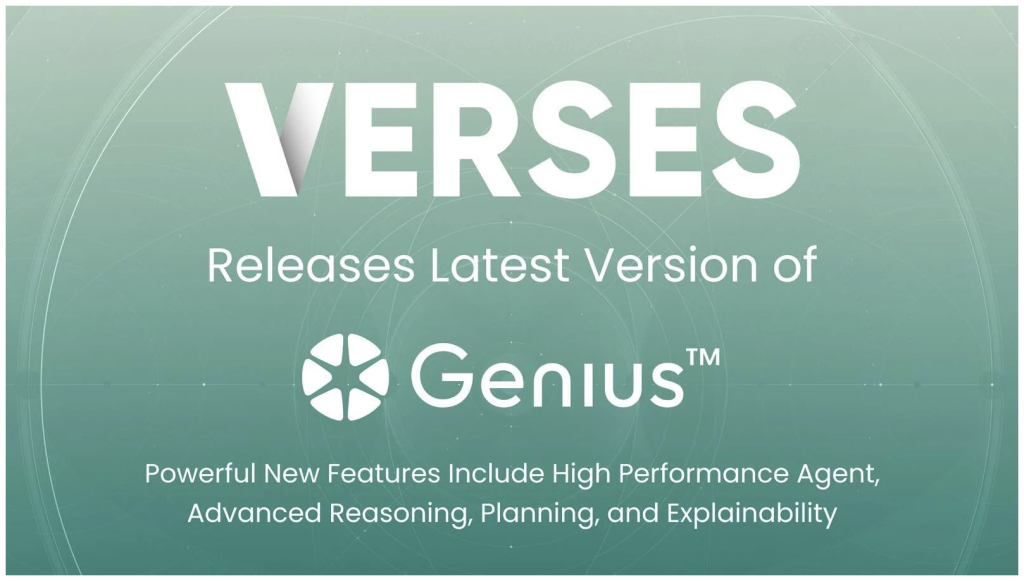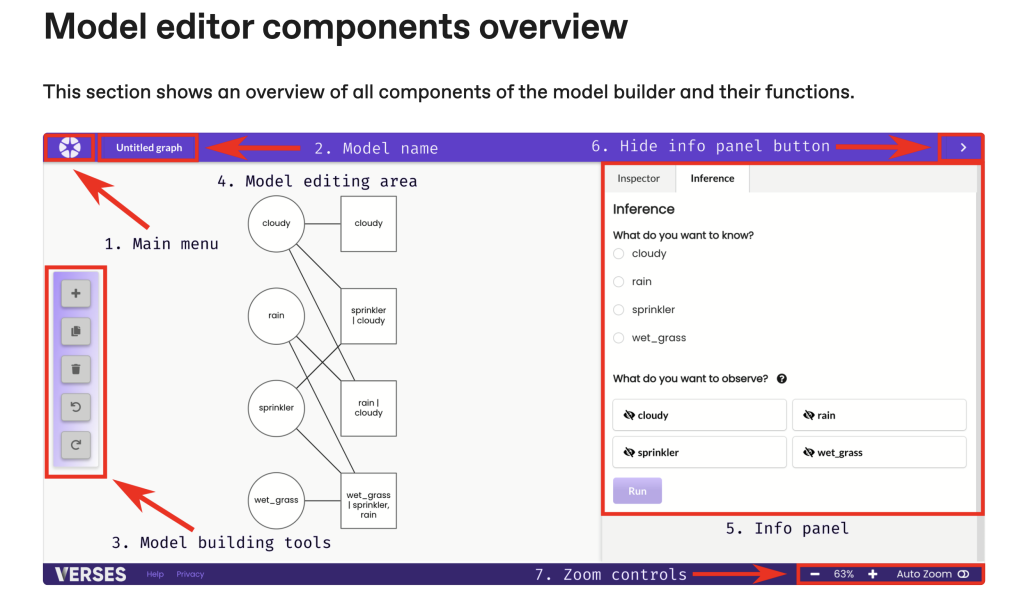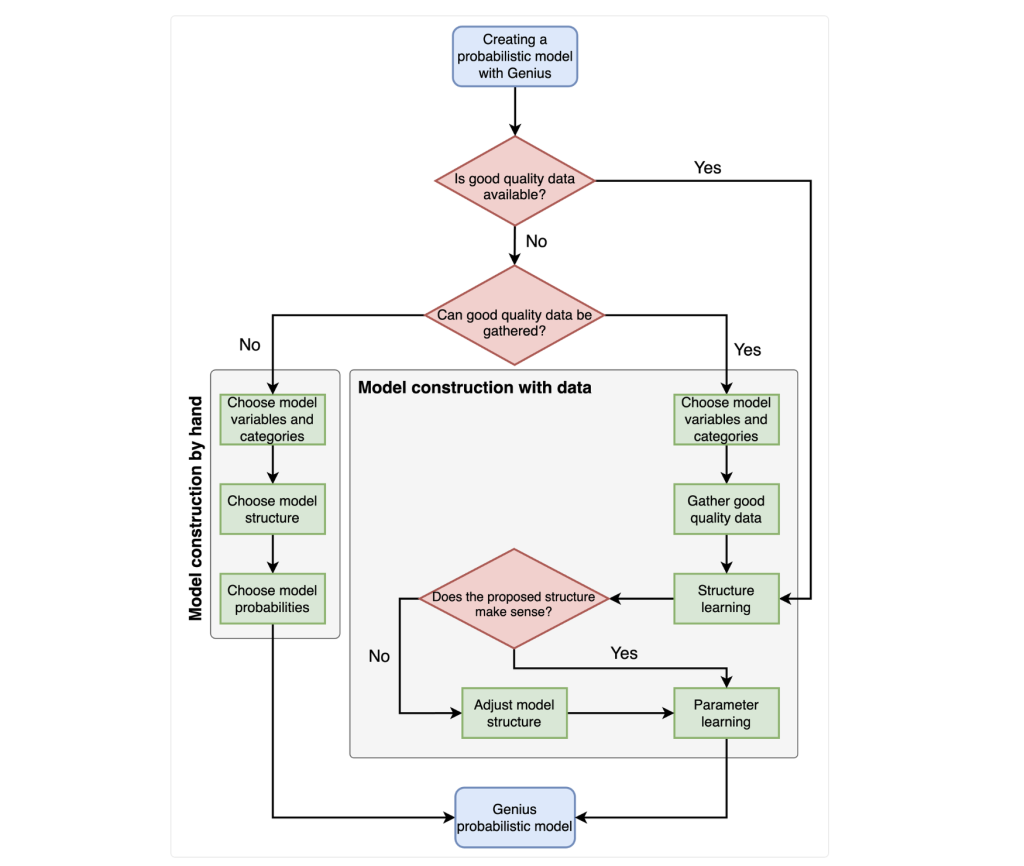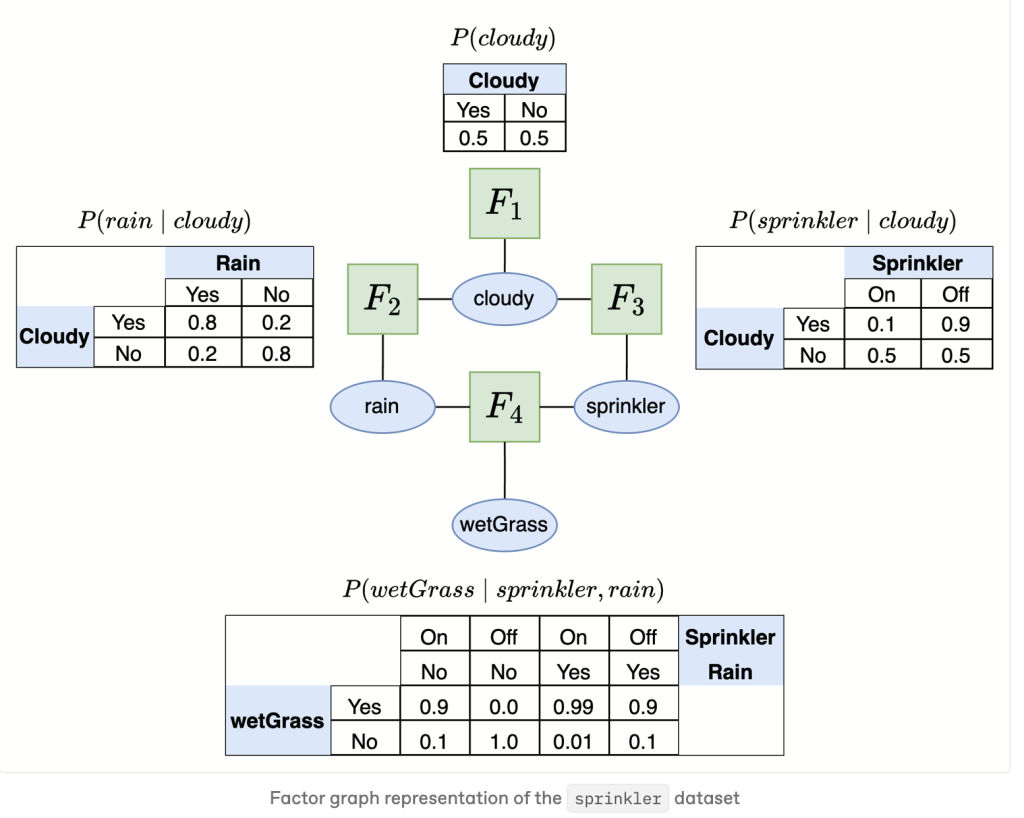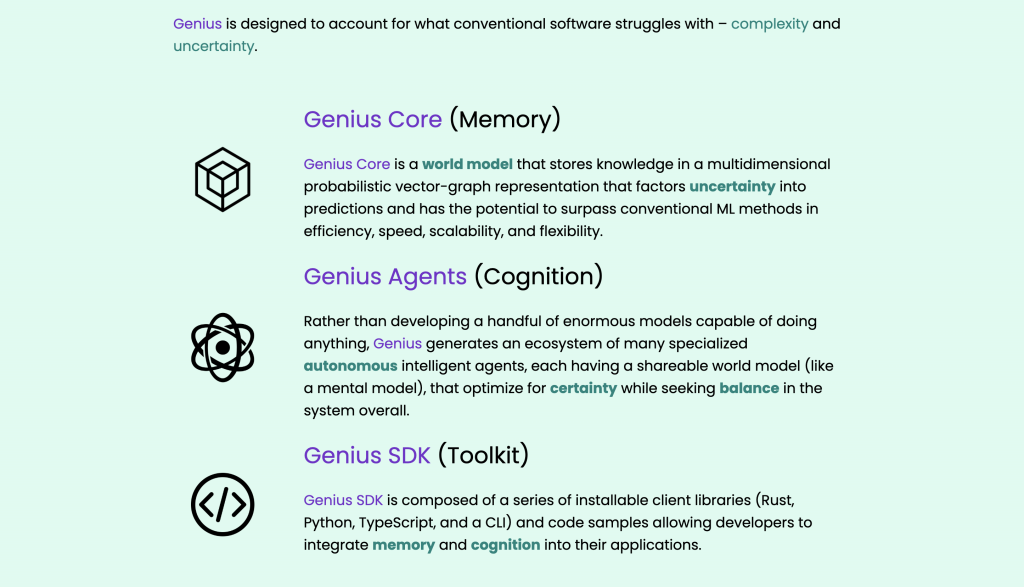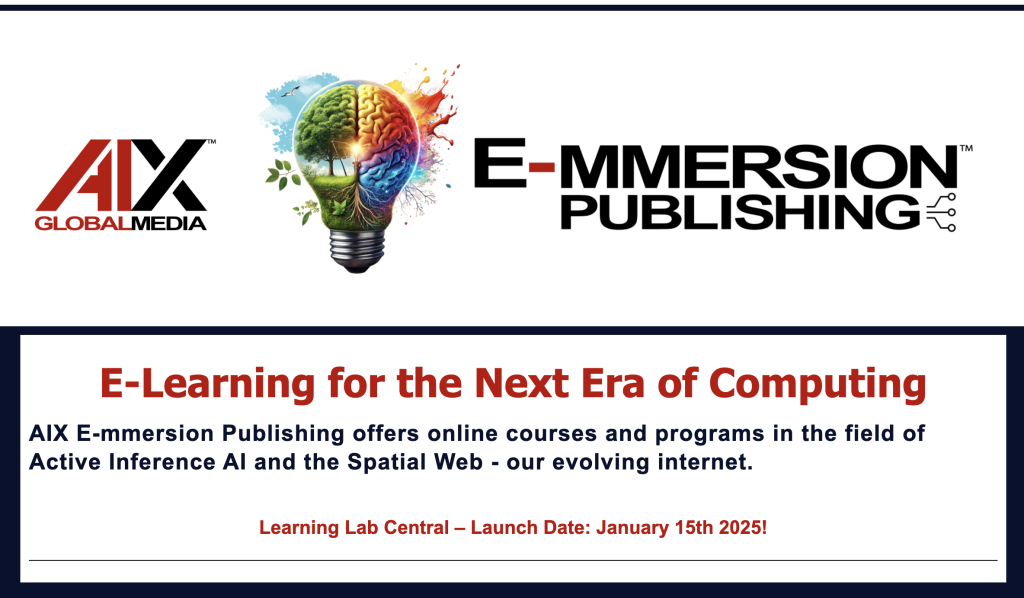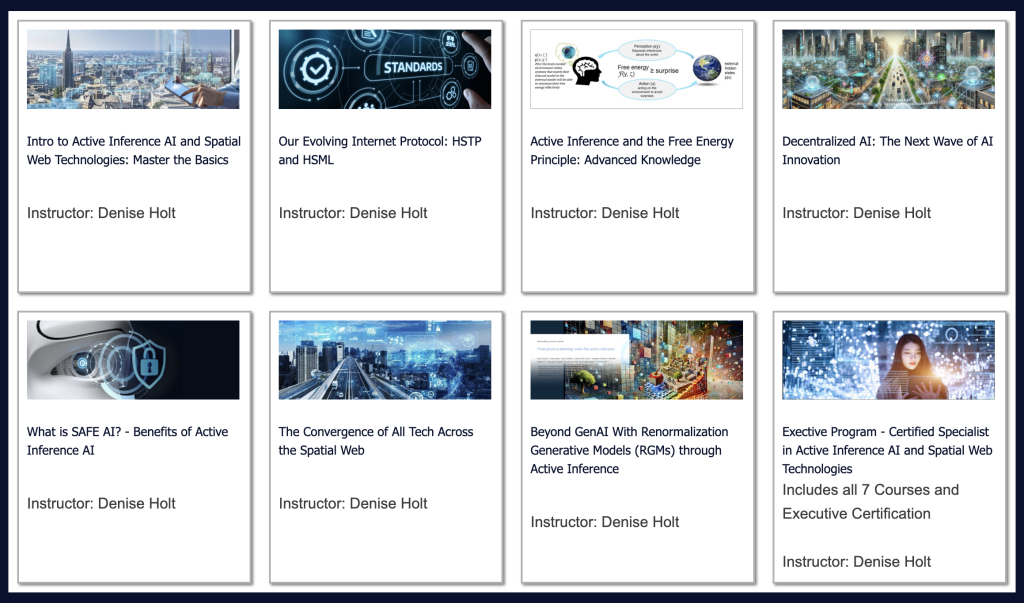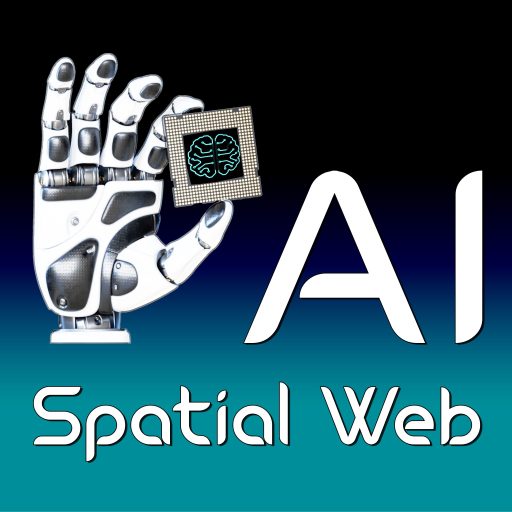Active Inference & The Spatial Web
Web 3.0 | Intelligent Agents | XR Smart Technology
Behind the Scenes with Genius: How Active Inference is Redefining the Very Definition of AI
Get Ready for a Major Shift in Technology.
- ByDenise Holt
- December 13, 2024
A massive digital transformation is coming. One that incorporates self-organizing, adaptive intelligence automation, distributed across networks, and operating at the edge — serving as a catalyst for a wave of innovation and progress that are likely to eclipse any we have experienced before. Our internet is expanding to include spatial domains, rendering digital twins of all systems, providing enhanced security, facilitating cross-team collaboration, and enabling operational control like never before. These changes will affect every business in every industry across the globe.
The world stands on the brink of a technological revolution. Adaptive intelligence automation through Active Inference AI is poised to redefine the very essence of AI and fundamentally alter how businesses operate. This next era of computing will touch every industry, driving innovation, enhancing efficiency, and reshaping decision-making processes.
The question that should be on everyone’s mind: How can I prepare for what’s coming next?
The Great Mindset Shift
Artificial intelligence has long been defined by classical machine learning and deep learning systems. However, a quiet yet transformative shift is underway. Genius™, the flagship platform from VERSES AI, enables the creation and deployment of Intelligent Agents powered by Active Inference — an approach that fundamentally redefines what AI can achieve, and how AI systems are developed and deployed.
Unlike traditional systems that rely heavily on massive datasets and static models, Active Inference AI is self-organizing and adaptive, learning in real time and making decisions under complexity and uncertainty. In fact, these Active Inference Agents can self-report and quantify their level of uncertainty, while optimizing for certainty — something that is impossible with deep learning.
This leap forward positions Genius™ as a revolutionary tool for building systems that can reason, plan, and evolve alongside dynamic environments, blending cutting-edge science with user-friendly design.
Let’s take a closer look inside the Genius™ platform, exploring its capabilities, features, and onboarding process to give developers and business leaders an inside look at this transformational tool.
What is Genius™?
On December 11, 2024, VERSES AI announced the release of their latest version of Genius™
https://www.verses.ai/press/verses-releases-latest-version-of-genius
Genius™ is the world’s first natural computing platform, inspired by principles in physics and neuroscience. It enables developers to create sophisticated world models and deploy Intelligent Agents that deliver hyper-personalized predictions, recommendations, and automations. Built to move beyond the limitations of traditional AI, Genius™ addresses complexity and uncertainty by continuously adapting its understanding of the world.
This platform represents a shift from static, data-heavy systems to dynamic, real-time AI solutions. By incorporating probabilistic reasoning, Genius™ allows developers to build systems capable of reasoning, planning, and acting autonomously in a wide array of environments. For businesses, it offers the tools to improve operations, optimize decision-making, and build explainable and accountable AI systems.
At its core, Genius™ is a platform for building and deploying Intelligent Agents based on Active Inference. Unlike traditional generative models, Genius™ Active Inference AI approach emphasizes learning and decision-making with minimal data, allowing for more efficient and adaptive AI systems.
For developers, Genius™ provides a comprehensive suite of tools that streamline the modeling and deployment of probabilistic systems.
For enterprises, it offers the potential to transform operations by integrating AI systems that are not only powerful but also explainable and scalable.
A New Era of Accessibility
Although still operating in private beta with select developers and enterprise partners, one of the most significant updates in the latest release of Genius™ is its graphical user interface (GUI). Moving away from “command-line only” interactions, the GUI makes it possible for users to visualize and validate models interactively. This feature democratizes access to Genius™, enabling both technical and non-technical users to engage with the platform effectively. The shift to a GUI underscores VERSES’ commitment to user-centric design and streamlining the onboarding process.
https://verses.gitbook.io/genius/6fG4baTqAyhcZpeLcucL/genius-overview/quickstart
Key Features of Genius™
1. Advanced Reasoning and Planning
Genius™ leverages probabilistic models and Bayesian inference to address complex decision-making challenges. These features make it particularly valuable for applications like predictive maintenance, logistics optimization, and personalized customer experiences.
2. Explainable AI
Transparency is a cornerstone of Genius™. With built-in explainability tools, the platform ensures that every decision made by its agents is traceable and understandable. This feature is critical for sectors like finance and healthcare, where accountability is paramount.
3. Flexible Model Development
Genius™ accommodates diverse development needs with tools ranging from an intuitive graphical user interface (GUI) for visual modeling to advanced SDKs for developers requiring granular control. JSON and CSV compatibility provide additional flexibility for data integration.
4. Robust APIs for Integration
Genius™ provides developers with APIs that facilitate seamless integration into existing systems. Whether embedding a Genius™ Agent in an IoT ecosystem or deploying it via cloud services, the platform adapts to various technical environments.
5. Onboarding Support
The Genius™ onboarding experience includes comprehensive tutorials and examples that guide users through building models, performing inference, and deploying agents. These resources are tailored to meet the needs of both novice and experienced practitioners.
6. High Performance with Minimal Data
Benchmarks reveal that Genius™ outperforms traditional models by achieving higher accuracy with less training data. For example, it demonstrated over 99% accuracy on the MNIST dataset while using 90% fewer resources than deep learning counterparts. (More benchmarks are expected to be announced in the coming weeks.)
The Genius™ Workflow
Users can choose from several methods to model Intelligent Agents, depending on their goals and expertise:
- GUI-Based Modeling: Ideal for users who prefer a visual approach, the GUI allows for easy definition of variables, dependencies, and probabilistic relationships, making it simpler to get started.
- Code-Driven Modeling: For advanced users, the Python SDK and accompanying libraries provide powerful tools to create detailed and customized agents, ensuring flexibility and scalability for complex tasks.
Modeling and Validation
Regardless of the method, users begin by defining variables and dependencies within their chosen environment.
The GUI and Python SDK provide interactive tools for refining and validating models, ensuring a smooth development process.
Learning and Adaptation
Genius™ Agents learn from datasets or real-time data streams using Bayesian estimation techniques. This capability enables dynamic adaptation to evolving environments and datasets.
These agents excel in their ability to adapt on-the-fly to changing environments by continuously learning from new data and outcomes. Using Bayesian estimation, agents update their probabilistic world models based on real-time feedback, ensuring that their decisions remain relevant and optimized over time.
https://verses.gitbook.io/genius/6fG4baTqAyhcZpeLcucL/genius-overview/quickstart
The Genius™ platform leverages two core types of probabilistic graphical models: Bayesian Networks and Factor Graphs. Bayesian Networks are directed acyclic graphs that represent dependencies and conditional probabilities among variables, making them ideal for reasoning under uncertainty and exploring causal relationships. They are particularly useful for tasks like predictive analytics, where understanding the influence of one variable on another is crucial.
Factor Graphs, on the other hand, are undirected graphical models that break down complex joint probability distributions into smaller, local functions. These are highly efficient for inference and are particularly suited for optimizing computations in large-scale systems, such as supply chain management or network performance optimization.
https://verses.gitbook.io/genius/6fG4baTqAyhcZpeLcucL/knowledge-center/factor-graphs
Additionally, the platform supports both parameter and structure learning, enabling agents to refine their understanding of relationships within data. Structure learning allows agents to identify dependencies among variables, while parameter learning adjusts the likelihoods within these relationships. Together, these processes ensure that agents not only perform well initially but also improve their accuracy and efficiency as they operate in real-world settings.
For developers, this adaptive capacity is supported through intuitive workflows in both the GUI and the Python SDK, allowing them to incorporate learning mechanisms tailored to specific applications. The result is a system that continuously evolves, offering businesses unparalleled resilience and flexibility in uncertain and complex environments.
Deployment and Real-Time Operation
Once validated, models can be seamlessly deployed using Genius™ APIs. The platform integrates effortlessly with diverse environments, from cloud-based systems to edge devices, enabling real-time decision-making through advanced inference algorithms. By calculating Expected Free Energy (EFE), it identifies optimal actions — a vital capability for industries such as autonomous systems and supply chain management.
Transforming Enterprise Applications
For business leaders, Genius™ offers a pathway to innovation and efficiency:
- Enhanced Decision-Making: Automate complex processes and improve predictive accuracy across operations.
- Cost Efficiency: Reduce resource consumption by leveraging Genius™’s ability to perform with less data and computational power.
- Regulatory Alignment: Build trust with stakeholders by deploying explainable and accountable AI systems.
2025 is the Year this Tech Lights Up
Genius™ marks the beginning of a new era in intelligent systems — an evolution that transcends traditional machine learning and deep learning frameworks. Its ability to model uncertainty, adapt to new information, and learn autonomously positions it as a transformative platform for the future of AI. VERSES AI’s roadmap for Genius™ includes adding advanced planning capabilities, enabling agents to optimize actions and manage outcomes seamlessly. The platform’s long-term vision involves fostering a collaborative ecosystem of specialized agents working toward shared goals, further enhancing its utility across industries.
https://www.verses.ai/genius
As these capabilities evolve, Genius™ is set to redefine industries ranging from healthcare and supply chain logistics to finance and smart city infrastructure. This versatility ensures that Genius™ will remain at the forefront of innovation, empowering developers and businesses to meet the demands of an increasingly dynamic and interconnected world.
Genius™ is just the beginning of a broader movement towards scalable, decentralized AI solutions. As VERSES’ roadmap continues to expand to include support for multi-agent systems and deeper integration with the Spatial Web Protocol, users can expect a platform that evolves alongside user needs.
→ Looking for Education About These Technologies?
Empowering Leaders Through Education
The innovative capacity of Genius™ reflects the broader paradigm shift driven by Active Inference AI and Spatial Web technologies. However, the transition to these systems requires new ways of thinking about AI, technology integration, and enterprise operations.
Recognizing this need, I have been hard at work developing a logical sequence of education around these topics, and I am excited to announce the upcoming launch of my new e-learning platform: E-mmersion Publishing’s Learning Lab Central, where I am introducing a 7-Course Executive Program on Active Inference AI and Spatial Web Technologies.
A Learning Experience Designed for Impact
This is the prerequisite knowledge everyone needs to know to succeed in this next era of technology.
Built for business leaders and developers, this Executive Program with Advanced Certification is a groundbreaking educational experience designed for leaders seeking to master the next evolution of AI and technology convergence. Spanning seven meticulously crafted courses, it covers:
- Foundations of Active Inference AI: Understand the principles that power adaptive, real-time decision-making systems.
- Spatial Web Technologies & Protocols: Discover how the next evolution of the internet enables security, cross-team collaboration, and operational control like never before.
- Self-Organizing AI & RGMs: Explore decentralized next-gen agentic AI frameworks and Renormalizing Generative Models.
- Distributed Intelligence for Innovation: Apply advanced adaptive intelligence to real-world enterprise challenges.
- Real-World Applications: Smart cities, healthcare, finance, supply chain, robotics, and more — learn how to implement and scale these technologies ethically and sustainably.
Courses:
This program equips leaders with the knowledge and tools to drive innovation, adaptability, and ethical AI implementation across industries.
The Countdown is On!
Learning Lab Central — Launch Date: January 15, 2025.
Early registrants will gain access to a live Q&A session with me in January 2025, offering personalized guidance to jumpstart your learning journey.
Give Yourself a Lasting Gift: Expertise for the Next Era of AI
As industries pivot toward adaptive, decentralized intelligent systems, the ability to understand and apply these technologies will be indispensable.
Don’t wait to adapt when the future arrives; shape it by preparing now.
Learn more about my Executive Program with Advanced Certification.

Denise Holt
Futurist | Advisor | Founder | Keynote Speaker
Active Inference AI and Spatial Web Technologies
More Articles by Denise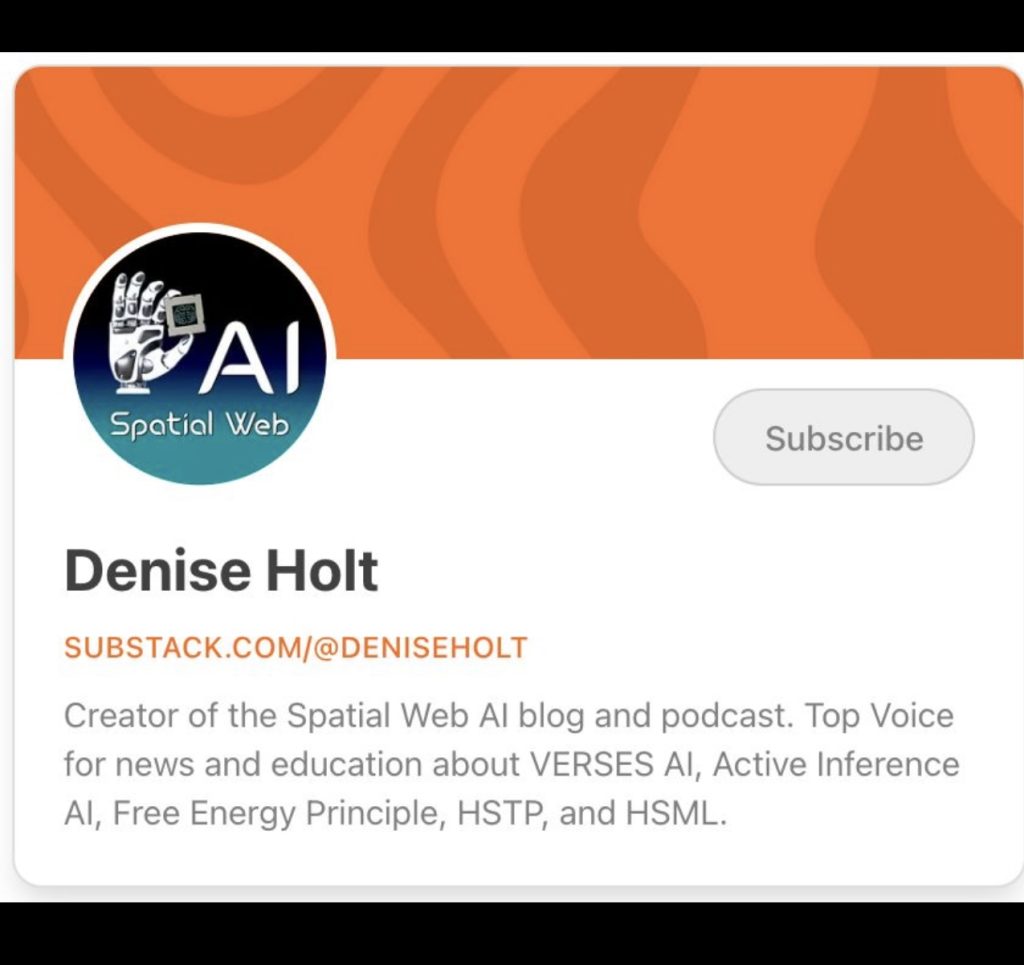
Join my Substack Channel
Substack is where our community thrives!
Become a paid member, and join us for Learning Lab LIVE!
Join the conversation of this cutting edge, safe, and trustworthy new approach to AI.

